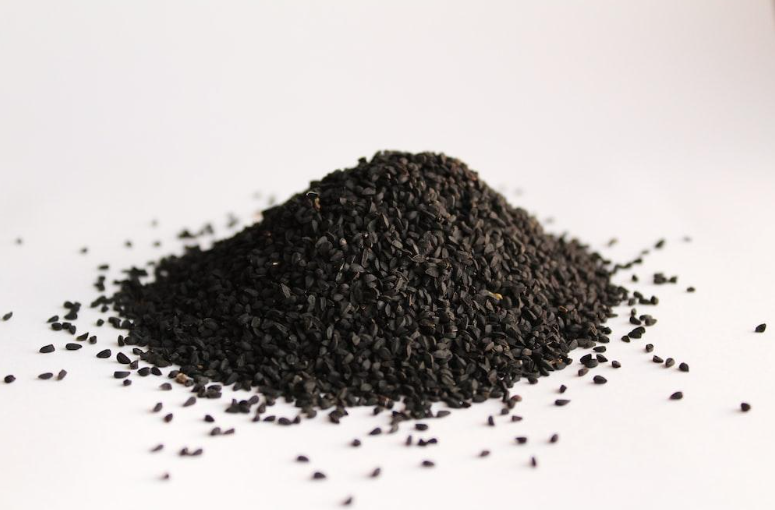Used in the East for thousands of years to support overall health and often, for specific health conditions, the small, black seed of the Nigella sativa plant is now being analyzed by researchers for its efficacy as a treatment or as a complementary therapy for addressing multiple illnesses.
The use of black seed oil for the treatment of human health problems starts with its principal ingredient – thymoquinone. So, let’s begin our examination of existing research by looking at the properties of this compound that’s receiving so much scientific attention.
What is Thymoquinone?
Science has been investigating the properties of thymoquinone for decades. Accounting for 30% of the black seed’s chemical makeup, thymoquinone may have beneficial effects on a wide range of illnesses and conditions.
What has been established by research to date, is that thymoquinone has the following abilities:
- hepatoprotective (protects the liver)
- anti-inflammatory
- anti-oxidative
- anti-microbial
- anti-cancer
- anti-metastatic (prevents cancer from spreading to other parts of the body)
Thymoquinone also may reverse learning, memory impairment, and oxidation in the brain. To date, this effect has been seen in lab rats. But the neuro-protective properties of thymoquinone are being established, as studies continue. What’s clear is that thymoquinone offers a tremendous range of applications to medicine, for the treatment of numerous health conditions.
In this post, I’ll discuss the most compelling research on black seed oil to date, with respect to key medical conditions. As you’ll see, all these conditions are familiar and widespread, making black seed oil a natural answer to some of humanity’s most pressing medical challenges.
Asthma
With a death toll approaching ½ a million, approximately 262 million people worldwide suffer from the respiratory illness, asthma. With a host of triggers from occupational factors like dust generated on shop floors to pollution or animal dander, asthma is a growing problem. It can even be triggered by stress.
Black seed oil has been identified as a complementary treatment for asthma and for seasonal allergies. Reducing soft tissue inflammation by inhibiting T-cell production is at least part of the reason for its efficacy in this application.
But black seed oil may also reduce eosinophilia (a preponderance of white blood cells). This effect is directly attributable to the anti-inflammatory properties of thymoquinone. The study cited here points out that patient resistance to prescribed medications is a problem linked to complicated delivery methods and the high cost of medications.
But this review of existing literature on the subject of asthma treatment using Nigella sativa, while acknowledging the need for further study with more rigorous parameters, finds significant cause for celebration. Asthma symptom control and improved lung function are just two indicators that continuing study is well merited. It’s possible that Saudi Arabia, which participated in a study with researchers at London University, will be the first country to enshrine Nigella sativa as a complementary medicine.
Metabolic Syndrome

With obesity in the USA skyrocketing and expected to become even more pressing as a public health concern, metabolic syndrome is presenting itself as a consequence. Metabolic syndrome is a cluster of conditions that amount to a perfect storm and may consist of the following factors:
- Excessive waist circumference: Fat stored in the mid-section is a greater threat to the heart than fat anywhere else in the body. Restricting the function of organs and causing an “apple” shape, midsection fat is a risk factor for heart disease.
- Hypertension: Sustained high blood pressure is a known risk factor for heart disease/heart attack.
- High triglycerides: Triglycerides are fat cells in your blood that raise your levels of LDL or “bad” cholesterol and concurrently, your risk of heart disease.
- High blood sugar: High levels of sugar in your blood raise the risk of blood clots, heart, and blood vessel disease.
- Low HDL cholesterol: This type of cholesterol assists in keeping LDL levels low in your blood. When LDL cholesterol is not contained, it can cause the buildup of plaque in blood vessels.
This condition affects 1 in 3 US adults. And by 2030, it’s projected that almost half of American adults will be obese. While that may sound like a dire prediction, it’s not a self-fulfilling prophecy. Cleaning up your diet and adding exercise to your routine can change everything. But how can black seed oil help?
At the heart of all the conditions listed above is one factor – obesity. As I’ve just said, exercise and diet can go a long way toward reducing or removing the risk factors represented by this suite of conditions, but so can black seed oil. But it’s not a silver bullet.
Black seed oil, when part of an intentional weight loss program, may ease the way. When diet is reformed and regular exercise is added, black seed oil acts as an appetite suppressant, serving to reduce portion size and calories consumed. While studies continue, black seed oil holds tremendous potential as a helpful companion on the journey toward a healthier body.
Diabetes
Black seed oil, especially for type 2 diabetes, is increasingly being shown as an effective complementary treatment. As with metabolic disorder, lifestyle changes are highly recommended as a means of controlling the condition. Exercise and diet are two highly effective means of managing diabetes symptoms. And with almost 15% of Americans living with diabetes, that’s good news.
Diabetes is a public health problem in need of more effective solutions. With the price of insulin becoming prohibitive and the disease’s growing prevalence, what’s even more important than controlling diabetes is preventing it. And Nigella sativa appears to be able to do that!
A review of existing studies concludes that black seed oil is capable of lowering blood glucose levels, provoking decreased resistance to insulin and increasing secretion of insulin from the pancreas. For the time being, black seed oil is seen as a complementary medicine to be used in tandem with antidiabetic pharmaceuticals. Patients may soon be able to lean less on costly pharmaceutical solutions.
Inflammation
Inflammation in the body is often a precursor to serious disease. Acute inflammation is a direct consequence of trauma but chronic inflammation is often concurrent with the following health conditions:
- Obesity
- Diabetes
- Cardiovascular disease
- Autoimmune disease
- Cancer
- Stress
Inflammation is at the heart of black seed oil’s efficacy, as inflammation lays the foundation for many physical illnesses. If you review the research we’ve covered in this article, it’s clear that Nigella sativa’s anti-inflammatory and antioxidant abilities are some of its most valuable attributes in terms of treating human health conditions.
This study, though, revealed that the way black seeds are stored can result in more effective preservation of thymoquinone content. A dark space with a temperature between 18-20 degrees centigrade serves to maintain levels of the compound in the seeds. In addition, oil extraction from one of either old or fresh seeds may be selected according to the final intended use of the oil. Black seed oil, in any event, is now considered an effective complementary treatment for inflammation. And, as the body of research grows, it’s expected that the little, black seed will reveal so much more about its applications.
Black seed oil is a gift to human health that is bringing the research community around to the value of phytoceuticals (plant-based medicine). With the rising cost of pharmaceutical solutions and a public ready to explore new horizons that are, in truth, ancient, black seed oil’s promise is only now beginning to be realized.
